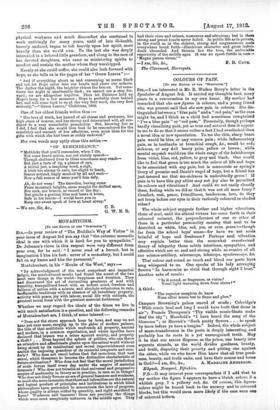MONASTICISM.
[To THY EDITOR OF THE " SFRCTLTOR."] Six,—In your review of "The Buddha's Way of Virtue" in your issue of August 3rd you say that "the extreme monastic ideal is one with which it is hard for you to sympathize."
Dr. Johnson's views in this respect were very different from your own, for he said : " I never read of a hermit, but in imagination I kiss his feet : never of a monastery, but I could fall on my knees and kiss the pavement."
Montalembert, in his " Monks of the West," says
" By acknowledgment of the most competent and impartial judges, the much-abused monks had found the secret of the two most rare things in the world—happiness and duration. They had discovered the art of reconciling greatness of soul with humility, tranquillised heart with an ardent mind, freedom and fullness of action with a minute and absolute submission to rule, ineffaceable traditions with an absence of all hereditary property, activity with peace, joy with labour, social life with solitude, the greatest moral force with the greatest material feebleness."
Whether we may regard the ideals of the times we live in with much satisfaction is a question, and the following remarks of Montalembert are, I think;of some interest :— " Does not the storm approach hour by hour, and may we not hear yet once more, surging up to the gates of modern palaces, the tide of that multitude which confounds all property, ancient and modern, in a common reprobation, and whose apostles have declared that leisure was a crime against society, and property a theft? . . . Even beyond the sphere of politics, who can throw an attentive and affectionate glance upon the actual world without being struck by its intellectual and moral impoverishment even amidst the imposing grandeur of its material conquests and com- forts ? Who does not recoil before that flat monotony, that vast ennui, which threatens to become the distinctive characteristic of future civilization? Who does not feel that the moral jurisdiction of souls lowers itself every day under the empire of material interests ? Who does not tremble at that universal and progressive empire of mediocrity in theory as in practice, in men as in things P Who does not dimly foresee an era of general baseness and weakness, so much the more incurable thatthese sad infirmities are the natural and logical product of principles and institutions in which blind philosophers have pretended to concentrate the laws of progress, whose quality is always stifled by quantity, and right sacrificed to force? Weakness and baseness ! these are precisely the things which were most completely unknown in the middle ages. They had their vices and crimes, numerous and atrocious; but in them strong and proud hearts never failed. In public life as in private, in the world as in the cloister, strong and magnanimous souls everywhere break forth—illustrious character and great indivi- duals abounded. And therein lies the true, the undeniable superiority of the middle ages. It was an epoch fertile in men- ' Magna parens The Claremont, Harrogate.






































 Previous page
Previous page